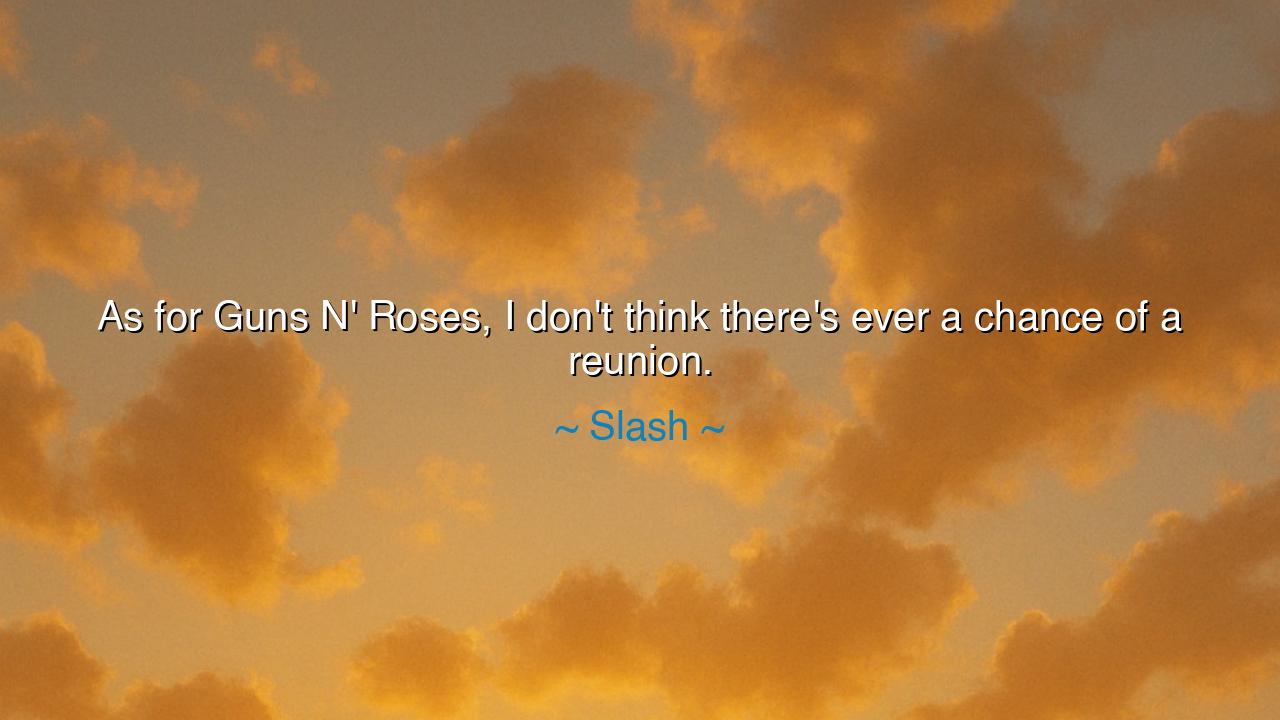
As for Guns N' Roses, I don't think there's ever a chance of a






In the labyrinth of life, there are moments when the forces of time, pride, and change converge, leaving once-strong alliances fractured beyond repair. Slash, the iconic guitarist of Guns N’ Roses, offers a sobering reflection when he declares, “As for Guns N' Roses, I don't think there's ever a chance of a reunion.” These words carry with them not just a sense of finality, but an acknowledgment of the complexities that come with human relationships, especially when fame and ego intertwine with the delicate threads that hold people together. It is a truth as old as time: not all things are meant to last, and not all bonds are built to withstand the test of time.
The ancients knew well the fragility of human relationships, particularly when ambition and destiny push individuals toward different paths. The story of Achilles and Agamemnon in the Iliad serves as a powerful reminder of how even the closest alliances can shatter under the weight of pride and personal conflict. Achilles, once a trusted warrior in Agamemnon's army, becomes enraged by the king's disrespect and chooses to withdraw from the battlefield. The wrath of Achilles, a man of unmatched strength and skill, becomes a metaphor for the destruction that can arise when pride and ego tear apart those who once stood side by side. In the case of Guns N’ Roses, the relationship between Slash and Axl Rose was similarly marked by both intense creativity and deep conflict, leading to a split that seemed irreparable. Slash’s words, then, echo the timeless wisdom of the ancients—some fractures, once made, cannot be mended.
This sentiment is not unique to the world of music; the struggles between collaborators can be found throughout history. Take, for example, the story of Julius Caesar and his loyal lieutenant, Pompey. Once united in the Triumvirate as co-leaders of the Roman world, their bond was eventually shattered by ambition, jealousy, and the clashing forces of their personal desires. Despite their earlier successes together, Pompey and Caesar’s partnership came to an end in a bitter civil war, illustrating the frailty of alliances built on personal conflict rather than shared vision. Like Slash’s reflections on Guns N’ Roses, this historical example speaks to the reality that the forces that drive greatness can also drive people apart. The bond, once solid and strong, can fray under the weight of personal desires and the quest for power.
The story of Guns N' Roses is a tale of passion, creativity, and rivalry—a testament to the chaos that often accompanies the pursuit of artistic excellence. The band, with its raw energy and powerful performances, became a symbol of a particular moment in rock history, but the internal strife between its members, particularly between Axl Rose and Slash, left lasting scars. Slash, in acknowledging the impossibility of a reunion, is recognizing a truth that many artists and creators come to understand over time: relationships, especially those formed under the intense pressure of success, are fragile. The very passion that drives creativity can often tear people apart, leaving them in irreparable conflict. Sometimes, time and experience reveal that the wounds inflicted cannot be healed, no matter how much we might wish for reconciliation.
And yet, reunion and forgiveness are themes that have been explored for centuries. The great Roman orator Cicero believed that forgiveness was the highest form of human virtue, an act that required great courage and humility. In his writings, Cicero spoke of the importance of reconciliation even after the deepest betrayals, for only through the restoration of relationships could society truly thrive. In the context of Guns N’ Roses, a reunion would require both parties—Axl and Slash—to transcend their personal grievances and ego, to find a path forward that honors both their individual journeys and their collective history. But the realities of the rock and roll world, filled with complex personalities, egos, and years of tension, make this a difficult and uncertain endeavor.
The lesson here is a sobering one: relationships, whether personal or professional, are delicate and must be nurtured with care. Like the ancient heroes who battled not just their enemies but their own internal conflicts, we too must recognize that trust and unity are built over time, and they can be broken just as quickly. Slash’s words remind us that the bonds we form—whether with a friend, a partner, or a collaborator—require not only shared vision but also shared commitment and the ability to navigate differences. In any partnership, there will inevitably be struggles and disagreements, but it is in the resolution of these conflicts, not their avoidance, that true growth and unity are achieved.
In our own lives, we must strive to build stronger connections, not by ignoring the inevitable conflicts that arise, but by facing them head-on with honesty, respect, and the desire to understand rather than conquer. While Slash may have acknowledged the end of a chapter in the history of Guns N’ Roses, we should recognize that no relationship is beyond repair if both parties are willing to engage in the hard work of reconciliation. Let us learn from the wisdom of the ancients, from the heroes of old and the creators of today, that the true power lies not in achieving greatness at any cost but in doing so while holding on to the bonds that connect us to others. Forgiveness, humility, and commitment—these are the true keys to long-lasting success and unity.






AAdministratorAdministrator
Welcome, honored guests. Please leave a comment, we will respond soon